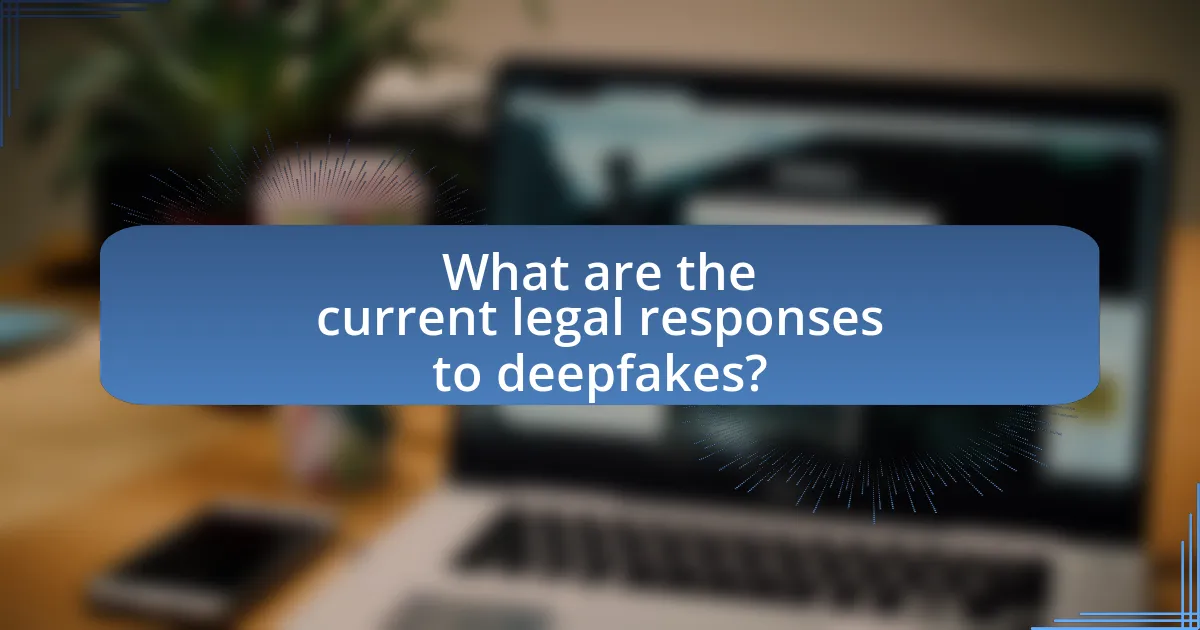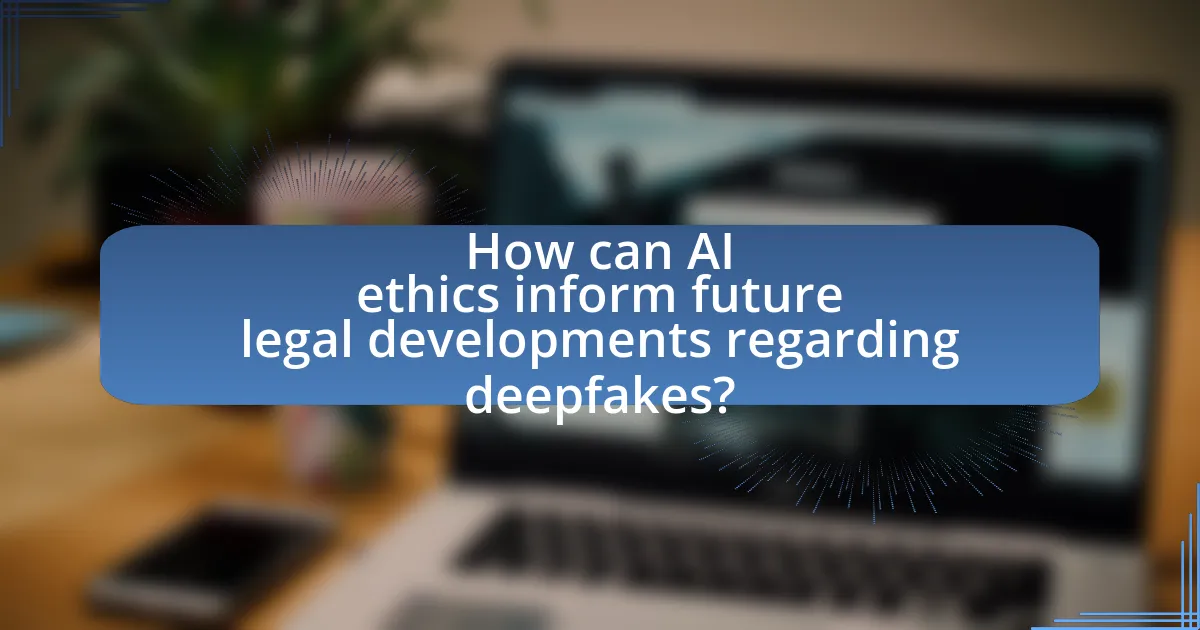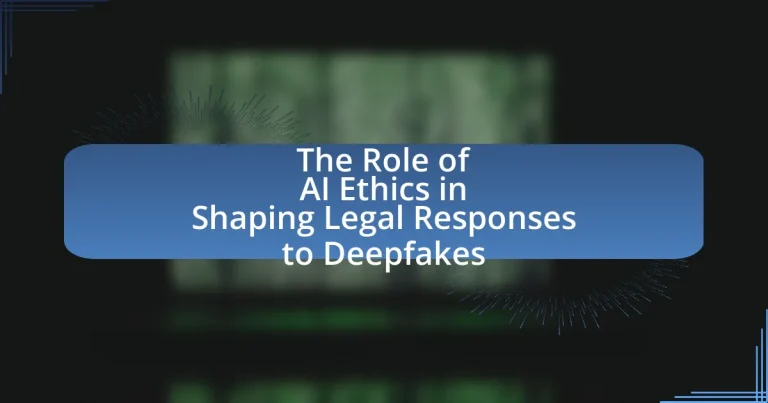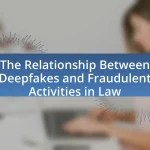The article examines the critical role of AI ethics in shaping legal responses to deepfakes, emphasizing the importance of accountability, transparency, and individual rights. It outlines how ethical principles such as authenticity, consent, and harm guide lawmakers in creating regulations that address the potential dangers of deepfakes, including misinformation and privacy violations. The discussion includes current legal frameworks, challenges faced by legislators, and the necessity for interdisciplinary approaches to effectively navigate the complexities of deepfake technology. Additionally, it highlights the significance of public perception and stakeholder engagement in developing ethical guidelines and legal standards.

What is the Role of AI Ethics in Shaping Legal Responses to Deepfakes?
AI ethics plays a crucial role in shaping legal responses to deepfakes by establishing guidelines that prioritize accountability, transparency, and the protection of individual rights. These ethical frameworks inform lawmakers about the potential harms of deepfakes, such as misinformation and privacy violations, leading to the development of targeted legislation. For instance, the European Union’s proposed Digital Services Act emphasizes the need for platforms to take responsibility for harmful content, reflecting ethical considerations in its legal approach. By integrating ethical principles, legal responses can better address the complexities of deepfakes, ensuring that regulations are not only reactive but also proactive in safeguarding societal values.
How do AI ethics influence the legal framework surrounding deepfakes?
AI ethics significantly influence the legal framework surrounding deepfakes by establishing guidelines that prioritize accountability, transparency, and the protection of individual rights. These ethical considerations drive lawmakers to create regulations that address the potential harms of deepfakes, such as misinformation, defamation, and privacy violations. For instance, the European Union’s proposed Digital Services Act incorporates ethical principles by mandating platforms to take responsibility for harmful content, including deepfakes, thereby shaping legal standards that reflect societal values regarding digital integrity and user safety.
What ethical principles are most relevant to the issue of deepfakes?
The ethical principles most relevant to the issue of deepfakes include authenticity, consent, and harm. Authenticity pertains to the integrity of information and the expectation that visual and audio content accurately represents reality. Consent is crucial, as deepfakes often involve the unauthorized use of individuals’ likenesses, violating personal autonomy and privacy rights. Harm addresses the potential for deepfakes to cause psychological, reputational, or financial damage to individuals and society. These principles are supported by the increasing recognition of the need for ethical guidelines in technology, as highlighted by the 2020 report from the Partnership on AI, which emphasizes the importance of responsible AI development and deployment.
How do these principles guide lawmakers in addressing deepfake technology?
Lawmakers are guided by principles of transparency, accountability, and harm reduction when addressing deepfake technology. These principles help ensure that legislation is designed to protect individuals from misinformation and potential harm caused by malicious deepfakes. For instance, transparency mandates that the creation and distribution of deepfakes be clearly labeled, allowing consumers to discern between authentic and manipulated content. Accountability holds creators and distributors responsible for the misuse of deepfake technology, which can lead to legal repercussions for those who engage in harmful practices. Harm reduction focuses on minimizing the negative impacts of deepfakes, such as defamation or fraud, by implementing regulations that deter malicious use. These guiding principles are essential for developing effective legal frameworks that balance innovation with the protection of public interests.
Why is it important to consider AI ethics in the context of deepfakes?
Considering AI ethics in the context of deepfakes is crucial because deepfakes can manipulate reality, leading to misinformation, defamation, and erosion of trust in media. The ethical implications arise from the potential for deepfakes to harm individuals and society by spreading false narratives or damaging reputations. For instance, a study by the Brookings Institution highlights that deepfakes can be used in political contexts to mislead voters, which underscores the need for ethical guidelines to govern their creation and use. Therefore, addressing AI ethics is essential to mitigate risks associated with deepfakes and to establish accountability in their deployment.
What potential harms do deepfakes pose to individuals and society?
Deepfakes pose significant harms to individuals and society by enabling the creation of misleading and harmful content that can damage reputations, spread misinformation, and undermine trust in media. Individuals can suffer from defamation, emotional distress, and privacy violations when their likeness is manipulated without consent, as evidenced by cases where deepfakes have been used to create non-consensual pornography or to falsely attribute statements to public figures. Society faces broader implications, including the erosion of trust in legitimate news sources and the potential for deepfakes to be weaponized in political contexts, as highlighted by a 2020 report from the Brookings Institution, which noted that deepfakes could disrupt democratic processes and incite violence.
How can ethical considerations mitigate the risks associated with deepfakes?
Ethical considerations can mitigate the risks associated with deepfakes by establishing guidelines that promote accountability and transparency in their creation and use. By implementing ethical standards, creators and users of deepfake technology can be encouraged to disclose the intent behind the content, thereby reducing the potential for misinformation and manipulation. For instance, organizations like the Partnership on AI advocate for ethical practices that emphasize the importance of consent and the potential societal impacts of deepfakes. This approach not only fosters responsible usage but also aids in developing legal frameworks that can address the misuse of deepfake technology effectively.

What are the current legal responses to deepfakes?
Current legal responses to deepfakes include the introduction of specific legislation aimed at addressing the misuse of this technology. For instance, several U.S. states, such as California and Texas, have enacted laws that criminalize the malicious use of deepfakes, particularly in contexts like election interference and non-consensual pornography. These laws empower individuals to seek legal recourse against those who create or distribute harmful deepfakes. Additionally, federal initiatives are being discussed to establish broader regulations, reflecting the growing recognition of deepfakes as a significant threat to privacy and security. The legal landscape is evolving as lawmakers respond to the rapid advancements in AI technology and its implications for society.
How have different jurisdictions approached the regulation of deepfakes?
Different jurisdictions have approached the regulation of deepfakes through a combination of existing laws and new legislation tailored to address the unique challenges posed by this technology. For instance, the United States has seen states like California and Texas enact specific laws targeting deepfake misuse, particularly in contexts such as election interference and non-consensual pornography. In contrast, the European Union has proposed regulations under the Digital Services Act that aim to hold platforms accountable for harmful content, including deepfakes, while also emphasizing transparency and user rights. Additionally, countries like Australia have introduced legal frameworks that criminalize the malicious use of deepfakes, reflecting a growing recognition of the potential harms associated with this technology. These varied approaches illustrate the global effort to balance innovation with ethical considerations and public safety in the realm of AI-generated content.
What laws have been enacted to combat the misuse of deepfake technology?
Several laws have been enacted to combat the misuse of deepfake technology, including the Malicious Deep Fake Prohibition Act of 2018 in the United States, which criminalizes the use of deepfakes for malicious purposes such as defamation or fraud. Additionally, California’s AB 730 law, effective from 2019, specifically targets the use of deepfakes in the context of elections and pornography, imposing civil penalties for violations. These laws reflect a growing recognition of the potential harms associated with deepfake technology and aim to provide legal recourse against its misuse.
How effective are these laws in addressing ethical concerns?
The effectiveness of laws addressing ethical concerns related to deepfakes is moderate, as they often struggle to keep pace with rapid technological advancements. Current legislation, such as the Malicious Deep Fake Prohibition Act, aims to criminalize the malicious use of deepfakes, yet enforcement remains challenging due to the evolving nature of AI technology. Studies indicate that while these laws can deter some unethical practices, they may not fully address the broader ethical implications, such as consent and misinformation, which require ongoing legal and ethical discourse.
What challenges do lawmakers face in regulating deepfakes?
Lawmakers face significant challenges in regulating deepfakes due to the rapid technological advancements and the complexity of defining harmful content. The evolving nature of deepfake technology makes it difficult to establish clear legal standards, as these manipulations can be used for both benign and malicious purposes. Additionally, the anonymity of creators complicates enforcement, as identifying individuals responsible for harmful deepfakes is often challenging. Furthermore, existing laws may not adequately address the nuances of deepfakes, leading to potential gaps in legal frameworks. For instance, the First Amendment protections on free speech can conflict with efforts to regulate deceptive content, creating a legal gray area that lawmakers must navigate.
How does the rapid evolution of technology complicate legal responses?
The rapid evolution of technology complicates legal responses by outpacing existing laws and regulations, creating gaps in legal frameworks. For instance, the emergence of deepfake technology has raised significant challenges for legal systems, as current laws often do not adequately address issues of consent, misinformation, and intellectual property rights associated with manipulated media. A study by the Brookings Institution highlights that the speed at which new technologies develop can lead to a lag in legislative processes, making it difficult for lawmakers to craft relevant and effective regulations. This disconnect results in a legal landscape that struggles to protect individuals and society from the potential harms of advanced technologies.
What role does public perception play in shaping legal frameworks?
Public perception significantly influences the development of legal frameworks by shaping lawmakers’ priorities and the urgency of legislative responses. When the public expresses concern over issues like deepfakes, it prompts legislators to consider new laws that address these societal anxieties. For instance, the rise of deepfake technology has led to increased public awareness and fear regarding misinformation and privacy violations, which in turn has spurred legislative bodies to propose regulations aimed at mitigating these risks. Research indicates that public opinion can lead to swift legal changes, as seen in various jurisdictions that have enacted laws targeting deepfakes in response to widespread public outcry.

How can AI ethics inform future legal developments regarding deepfakes?
AI ethics can inform future legal developments regarding deepfakes by establishing guidelines that prioritize accountability, transparency, and the protection of individual rights. These ethical principles can shape laws that address the misuse of deepfake technology, ensuring that creators and distributors of harmful deepfakes are held responsible for their actions. For instance, ethical frameworks advocate for consent and authenticity, which can lead to legal standards requiring clear labeling of manipulated content. Furthermore, the increasing prevalence of deepfakes has prompted discussions among lawmakers and ethicists about the need for regulations that balance innovation with societal protection, as seen in legislative proposals in various jurisdictions aimed at criminalizing malicious deepfake use.
What best practices can be adopted to ensure ethical considerations are integrated into legal responses?
To ensure ethical considerations are integrated into legal responses, legal frameworks should incorporate interdisciplinary collaboration among legal experts, ethicists, and technologists. This collaboration facilitates a comprehensive understanding of the implications of deepfakes, ensuring that laws are not only technically sound but also ethically responsible. For instance, the inclusion of ethical guidelines in the drafting of legislation can help address potential harms associated with deepfakes, such as misinformation and privacy violations. Research indicates that jurisdictions that adopt a multi-stakeholder approach in policy-making are more effective in addressing complex issues like deepfakes, as seen in the European Union’s approach to digital content regulation.
How can stakeholder engagement enhance the development of ethical guidelines?
Stakeholder engagement enhances the development of ethical guidelines by incorporating diverse perspectives and expertise, which leads to more comprehensive and applicable standards. Engaging stakeholders, such as industry experts, ethicists, and affected communities, ensures that the guidelines address real-world implications and ethical dilemmas associated with AI technologies, including deepfakes. For instance, a study by the Berkman Klein Center for Internet & Society at Harvard University highlights that inclusive stakeholder dialogues can identify potential harms and ethical concerns that may not be apparent to a limited group of policymakers. This collaborative approach fosters trust and accountability, ultimately resulting in ethical guidelines that are more robust and widely accepted.
What role do interdisciplinary approaches play in shaping effective legal responses?
Interdisciplinary approaches play a crucial role in shaping effective legal responses by integrating diverse fields such as technology, ethics, law, and social sciences. This integration allows for a comprehensive understanding of complex issues like deepfakes, where legal frameworks must adapt to rapidly evolving technological landscapes. For instance, insights from computer science inform lawmakers about the technical capabilities and limitations of deepfake technology, while ethical considerations guide the development of regulations that protect individual rights and societal values. Research indicates that collaborative efforts among these disciplines lead to more robust legal frameworks, as seen in the European Union’s proposed regulations on artificial intelligence, which incorporate input from various stakeholders to address the multifaceted challenges posed by AI technologies.
What practical steps can individuals and organizations take to navigate the ethical landscape of deepfakes?
Individuals and organizations can navigate the ethical landscape of deepfakes by implementing robust verification processes and promoting digital literacy. Verification processes, such as using AI tools to detect deepfakes, can help identify manipulated content, thereby reducing the spread of misinformation. For instance, platforms like Facebook and Twitter have begun employing AI algorithms to flag potentially deceptive media. Additionally, promoting digital literacy through educational programs enables individuals to critically assess the authenticity of online content, fostering a more informed public. Research indicates that increased awareness and education can significantly reduce the impact of deepfakes on society, as seen in initiatives by organizations like the Media Literacy Now campaign.
How can awareness and education about deepfakes contribute to ethical usage?
Awareness and education about deepfakes can significantly contribute to ethical usage by equipping individuals with the knowledge to discern between authentic and manipulated content. This understanding helps mitigate the risks of misinformation and exploitation associated with deepfakes, as studies indicate that informed users are less likely to fall victim to deceptive media. For instance, a survey by the Pew Research Center found that 86% of respondents believed that education on digital literacy could help combat the negative impacts of deepfakes. By fostering critical thinking and media literacy, awareness initiatives can promote responsible consumption and sharing of digital content, ultimately leading to a more ethical digital environment.
What resources are available for understanding the intersection of AI ethics and law?
Resources available for understanding the intersection of AI ethics and law include academic journals, books, online courses, and organizations focused on technology policy. Notable academic journals such as the “Harvard Journal of Law & Technology” and “AI & Society” publish peer-reviewed articles that explore legal implications of AI technologies. Books like “Weapons of Math Destruction” by Cathy O’Neil and “Artificial Intelligence and the Law” by John D. McCarthy provide in-depth analyses of ethical and legal challenges posed by AI. Online platforms like Coursera and edX offer courses on AI ethics and law, featuring contributions from leading universities. Additionally, organizations such as the Electronic Frontier Foundation and the Future of Privacy Forum provide resources and reports that address the ethical and legal dimensions of AI technologies, including deepfakes.


